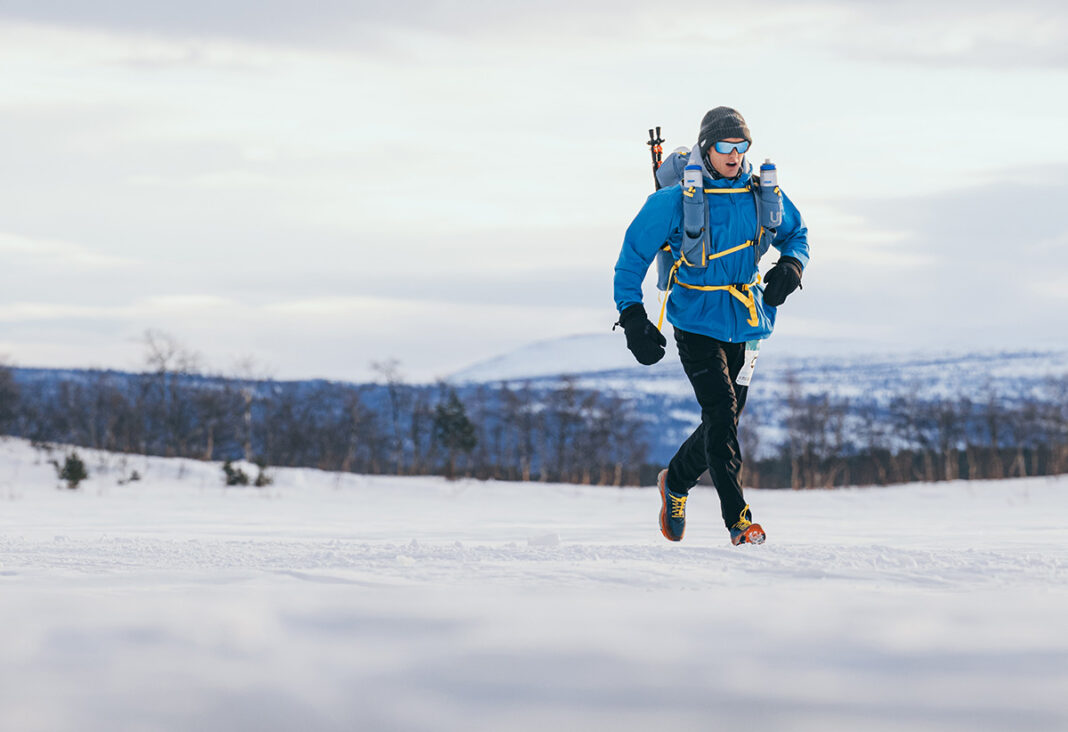In February, Bay of Plenty Business News columnist Freddie Bennett attempted the world’s toughest, coldest footrace: running 250km across the frozen Arctic in five days, carrying all his food and survival supplies on his back. He reveals the lessons he learned from the sub-zero wilderness that you can use to win at work, and at home.
“The cold wants to kill me.”
One solitary thought playing on repeat inside my head as I trudged through knee-deep snow. Somewhere beneath my feet, the ice cracked and splintered, with a sound like a gunshot.
I was too tired to react. Running across the endless, sterile expanse of a frozen lake for five hours had dulled my senses. I had lost all sense of time, momentum, and – more worryingly – feeling in my fingers and toes.
If this wasn’t concerning enough, I had another 35 kilometres to run that day. I would then get a few precious hours to eat by candlelight and dry my snow-sodden clothes near a tiny wood burning stove. Then I would rise before dawn and run another marathon over gale-swept mountains and through haunting, snow-covered forests in temperatures that would fall to -45 degrees. Then the next day, I would run another marathon, followed by a 65-kilometre ultramarathon the day after.
Upon this journey, I would experience frostbite, snow blindness and hallucinations. I would get so disoriented in blizzard conditions that I’d collapse and fall to the frozen ground. I’d encounter extreme hunger, tearful breakdowns, blisters … and a head-on collision with two reindeer in the dead of night.
Why would I want to do this? Why the goal to become the only person in New Zealand to fly 12,000 miles to the Arctic circle and attempt the world’s toughest, coldest multi-day ultramarathon? The long answer is in my article from February’s issue of Bay of Business News.
But the short answer is this: To prove to YOU that you can achieve more in your career and your life.
I’m not a runner, an athlete, or one of these square-jawed ex-special forces types. I’m just an everyday guy who not so long ago was a corporate exec with a beer belly, a mental health problem, a crippling mortgage and a severe case of imposter syndrome.
To help you on your journey through the perilous corporate landscape, here are my five lessons learned from the Arctic.
You are your own greatest risk
I was running through the deadliest place on the planet. The cold, the snow, the ice and the wildlife (polar bears) all had the capability of sending me back to New Zealand in a box.
But the greatest risk to me, was me. My actions, my behaviours and decisions would ultimately make the difference between success and failure, and, in a couple of hairy moments, life or death.
The same applies to you. Where are you tripping yourself up? Why are you making things hard for yourself? You know what you need to do. You can clearly see the action you need to take. The real issue isn’t the client, the economy, the supplier, the employee or the technology. The real issue is you. Get out of your own way.
Stop waiting for permission to be great
I had no right to be in this race. I was too old. Too busy. I lived too far away. I wasn’t fit enough. I wasn’t prepared enough. Surrounded by a bunch of seasoned athletes and explorers, I was almost crippled by imposter syndrome.
Who was I to believe I could do something this special?
But despite the doubt, the fear and the severe lack of confidence, I went ahead and did it anyway.
You do not have to seek permission to do great things. You do not have to wait for the perfect moment. You do not have to wait for things to be ‘less busy’.
You have to act. Even if you don’t feel like it. Even if you doubt yourself. The only permission you need is your own.
Fundamentals beat tactics
The best way to build momentum over the frozen mountain peaks and across the barren icy landscape was to dumb things down and keep it simple: Stay hydrated; Keep eating; Don’t stop moving; If I’d ignored the fundamentals, my race would be over.
Yet, at work, 99% of people look for the advanced ‘secret’ tactics, habits and hacks before ever nailing the absolute fundamentals.
The top 1% of performers are simply better at the fundamentals than anyone else.
Whatever your goal, ask yourself: “What are the absolute non-negotiables here? What do I need to get right every single time, no matter the circumstance or situation”.
The answer reveals where you should be focusing your efforts.
Always move forward
I spent many years of my corporate career skating on thin ice, but there were moments in the Arctic that were some of the darkest and most perilous of my life.
You’ve experienced this feeling: That plummeting sensation in your stomach that makes you believe that nothing will ever be good again. The paralysing, confusing terror when you realise you’ve messed up and there’s no getting out of it.
But these moments when you want to curl up in a ball and cry are when you must move forward.
It doesn’t matter if it feels like you’re going through hell in your career: The best opportunities are always ahead of you.
Have a story to tell
The quality of your life directly correlates to the number of stories you have to tell.
Simply having money in a bank account, an impressive-sounding title on LinkedIn or a Porsche on the driveway does not tell a compelling tale.
This isn’t about accumulating. It’s about living (and I say this as a card-carrying capitalist). Think about everything you’re working for, everything you’re sacrificing: None of it really matters unless you have a story to tell.
Put yourself on a mission that you truly believe in. Say ‘yes’ to the things you wouldn’t (or shouldn’t). Do the things you believe you cannot do.
Your colleagues, clients and kids don’t want an elevator pitch, nor a verbal recital of your CV. They want to hear your story … and see you live it.
As the finisher’s medal was placed around my neck, I realised this chapter of my story had ended. I have the memories, the scars and the frostbite.
I ran this race to prove that with the right knowledge, mindset and habits, everyday people can achieve remarkable things.
So, if I can go from a frozen rock bottom to the icy peaks … imagine what you can achieve.
Related: Freddie Bennett speaks to ZB’s Roman Travers about the 250km Ice Ultra race












